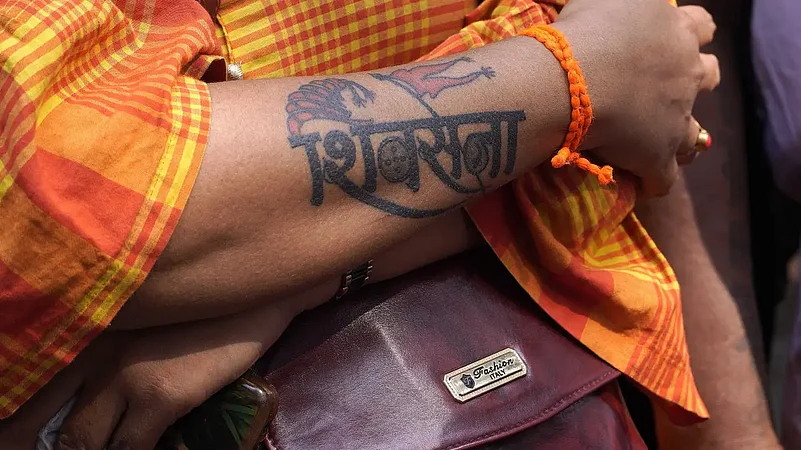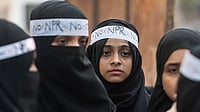Arvind Sawant, a two-time Shiv Sena member of Parliament from South Mumbai, is a slightly-built man on whose frame the word ‘king slayer’ sits heavy. He rose to prominence on the national political scene after he defeated the powerful Congress party candidate Milind Deora in the Lok Sabha elections of 2014 and 2019.
A former Union minister for Heavy Industries and Public Enterprises in the Narendra Modi government in 2014, Sawant quit the job due to the then ongoing power struggle between the Shiv Sena and the Bharatiya Janata Party (BJP), while his party was still a constituent of the then ruling National Democratic Alliance (NDA).
A Balasaheb Thackeray loyalist, Sawant joined Shiv Sena in 1968, two years after the party came into being. He started as a gat pramukh, the lowest rank in the party hierarchy and rose to his present stature within the party not just due to his loyalty but for the work he has done to spread the Shiv Sena in the Congress party’s bastion of South Mumbai.
Presently, Sawant is the president of the Bhartiya Kamgar Sena, the trade union of the Shiv Sena, a post he has held on to for a long time. Prior to joining full-time politics, he worked as a junior engineer with the state-owned Mahanagar Telephone Nigam Limited (MTNL), the largest landline provider in Mumbai and Delhi.
Some excerpts from an interview with Arvind Sawant.
Now that the Shiv Sena is headed for a split, where do you stand?
There will be no split in the Shiv Sena. All those who have left the party will come back. It is just a matter of time. I am a Shiv Sainik of the Shiv Sena of Balasaheb Thackery and will always be a Shiv Sainik. The Shiv Sena will never split.
The Marathi Manoos has lost out in the mega redevelopment that is taking place in Mumbai. Where is the Marathi Manoos in Mumbai?
The Marathi Manoos is very much in Mumbai. The development domain is very big. They have shifted to other parts of Mumbai due to the affordability factor and the expanding size of the family.
Is there a plan by the rebels aided by the BJP to have a Shiv Sena without the Thackerays?
It seems to be so. The BJP wants to break up Shiv Sena and make sure that there is no Opposition. There cannot be a Siv Sena without the Thackerays. You cannot take the Thackerays out of the Shiv Sena nor take the Shiv Sena out of the Thackerays.
Did you ever think that the Shiv Sena would be facing an existential crisis as it is today?
The Shiv Sena has faced several crises in the past and has always come out stronger. This is a crisis but not an existential one. This too will pass.
There were many workers who were retrenched during the Covid-19 lockdown and unemployment is very high. How did the Bharatiya Kamgar Sena (BKS) deal with this?
It is one of the prime trade unions in the country today. We are making agreements and taking care of the employees. We faced very severe trouble during the pandemic. The hospitality and aviation industry suffered a lot.
A five-star hotel had posted a notice announcing retrenchment on a very large scale. I had a dialogue with the owner of the hotel and told him that he must not sack the employees. His hotel was not doing too well. We told him if he compromised on some points, the employees will also do so. I told him that many hotels that he had built were due to the diligence of the workers. I told him to reduce salaries but don’t snatch away the jobs. Ghar ka chula jalne do (Let the cooking fire on in households). We made an agreement that for some months the workers would take a pay cut. Once everything opened up, they should be given their original salaries.
The worst action has been taken by the Central government where they have amended labour laws. All the guarantee for the jobs has been snatched away due to amended laws. The hire and fire culture has come in and workers have lost the job security. What is their future? Today they are young but what will happen when they are 60 or after that? No assurance. The BKS has strongly opposed this but the Central government is not listening. A day will come when the workers will rise in revolt.
How did you get into politics?
We used to listen to Balasaheb’s speeches at Parel and Lalbaug as we lived there. We used to go crazy listening to speeches. Padhai chod ke Shiv Sena key peeche bhagte the (We used to run after Shiv Sena after leaving our studies).
Once we were in school studying after the classes were over. There was a Congress party sabha going on in our school. We got angry at this and shouted Shiv Sena Zindabad. We got beaten and punished by school authorities. We were beaten up and it hurt badly. We could not go home and tell our parents that we were beaten up in school. We felt proud to hold the saffron flag of the Shiv Sena and go around with it.
How did these speeches inspire you?
They were very powerful speeches. We would listen to them, come home and beat someone up. He spoke about dealing with injustice against the poor. Vandaniya Balasaheb’s speeches inspired you into quick action. Balasaheb spoke of nationalism, of loving the country. Once when Pakistan had won a match and people burst crackers on the streets in Mumbai, Balasaheb was very angry and spoke about it. The Shiv Sainiks swung into action and took action. The oratory skills of Balasaheb cannot be matched.
What were your early days like?
Those days were not easy. We lived in a chawl and faced a lot of hardships. My father was the sole bread-winner for a large family. We were seven children – three brothers and four sisters. My father was in the service sector. We belonged to the upper caste Marathas so we did not get any concessions in school or college.
My mother did not have a mangalsutra around her neck. When I needed money for the admission to first year senior college, she pawned her mangalsutra and gave me money for fees. Afterwards she wore plain black beads around her neck. (His eyes mist over, his voice wobbles and he got emotional recollecting the days of struggle.)
Char anna was the bus fare, half ticket was for 10 paise. I was thin so I would buy a half ticket. One day the conductor reprimanded me for buying a half ticket despite being in college. I have seen so much poverty and struggle. Today we are all in much better place. I worked in MTNL as junior engineer.
How was life in the chawl?
There was a bonding in the hardships that we faced. No one had too much and we were happy in that. The men went to work, the children went to school or colleges and the women were homemakers. There were people from every place in Maharashtra and from outside the state living in the chawls.
There were arguments, there were fights but when someone was ill or needed you, everyone would help out. I remember this incident from childhood. We had South Indians as neighbours. There was a common bathroom and toilet on every floor of the chawl. They would take oil baths and the bathroom would be oily. People had told them to stop doing it as many were slipping. They told us all hamare gaon mey aisa hota hai. One day, my mother slipped on this oil and fell in that bathroom. She came home and old my dad.
My dad went out, bought some fish, came home and asked my mother to keep it aside till he came home from work. In the evening he took this fish out, kept it on a table outside our house in the common verandah. The smell was terrible. That family came and told my father to keep the fish somewhere else as they were vegetarians. My father told them hamare gaon mey aisa hota hai. They got the message loud and clear.
How did you enter politics?
I got into politics due to the sons-of-the soil (Marathi Manoos) issue. Back then, every other community would get jobs. You went into Bank of Baroda and found only Gujaratis there. In Bank of India, Parsis were employed. All South Indians were in Vijaya Bank. We could not find the sons-of-the-soil employed anywhere.
Balasaheb had started the magazine Marmik and used to write a column – Vachha ani thanda bassa (read and sit quietly). He would publish names of employees of the various banks and point out that there were no Marathi employees. Then in Mumbai, those living here would call their relatives from the South and other states and get them jobs in Mumbai. I agitated in the telecom sector for jobs for the sons-of-the-soil.
How were agitations done back then?
Balasaheb used to tell us to help the poor and that poverty has no caste, religion or region. There will only be two types of people – the rich and the poor. Help the poor, he had told us.
When MTNL was formed, there were vacancies in the public sector. Mumbai MTNL was recruiting for 350 vacancies and not one Marathi person got in. The Shiv Sena had just formed the Sthaniya Lokadhikar Samiti and we went to the MTNL office and demanded to see files of the recruitment process. We protested against this recruitment process. I was surrounded by the police. Those days we were scared of the police as they would beat up the Shiv Sainiks.
I told the DCP that we had jobs. We were not fighting for ourselves or our siblings. We were fighting for the sons-of-the-soil. He put me in the police van, drove away and let me off somewhere far away. The Shiv Sainiks did not allow anyone to write that exam. We drove them away from the exam centre. They released the advertisement again. People came from all over Maharashtra and appeared for that exam. Since then, we have agitated for the rights of the poor.


























